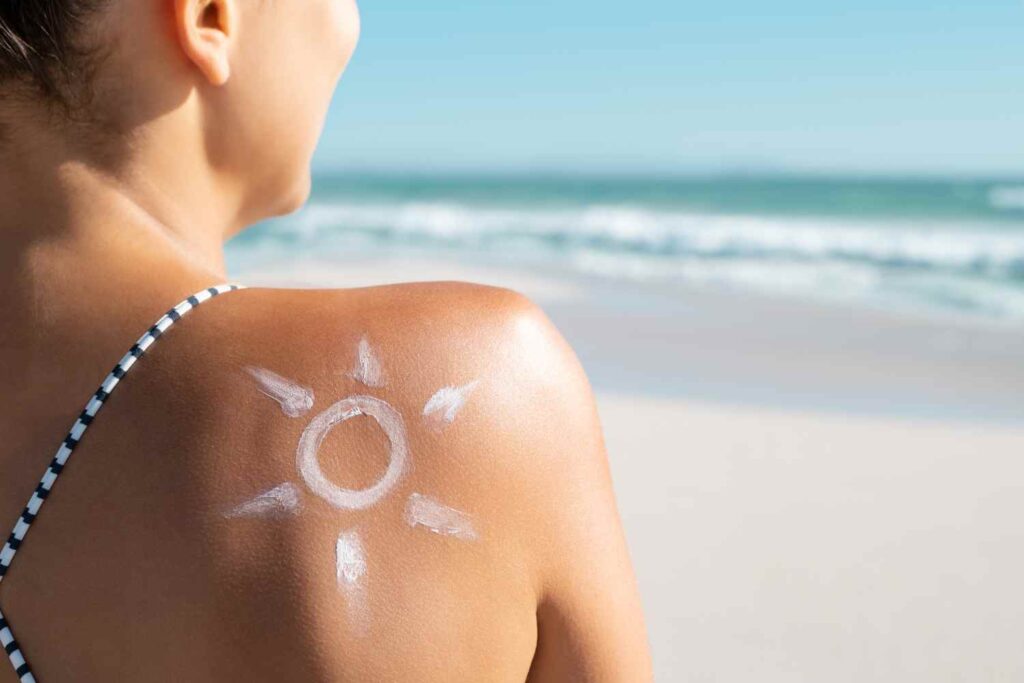
- March 18, 2023
- Comments: 0
- Posted by: admin
 Learn how to choose the right SPF for your skin type and protect your skin from harmful UV rays with our guide to sun protection. Our bodies require vitamin D, which is abundant in the sun. On the other hand, continuous sun exposure might be harmful to our skin. Premature aging, wrinkles, dark patches, and skin cancer are all possible effects. The sun can be an ally or an enemy. Although it offers warmth, light, and vital vitamin D, it may also seriously harm our skin. Overexposure to the ultraviolet (UV) rays of the sun can result in sunburn, early aging, and a higher chance of developing skin cancer.
Learn how to choose the right SPF for your skin type and protect your skin from harmful UV rays with our guide to sun protection. Our bodies require vitamin D, which is abundant in the sun. On the other hand, continuous sun exposure might be harmful to our skin. Premature aging, wrinkles, dark patches, and skin cancer are all possible effects. The sun can be an ally or an enemy. Although it offers warmth, light, and vital vitamin D, it may also seriously harm our skin. Overexposure to the ultraviolet (UV) rays of the sun can result in sunburn, early aging, and a higher chance of developing skin cancer.
Fortunately, there are a number of defenses against the damaging effects of the sun, one of which is the use of high-quality sunscreen. Choosing the best sunscreen for your skin type can be difficult, though, because there are so many various types and brands on the market. We’ll talk about the value of sun protection and how to pick the best SPF for your skin type in this blog post.
Why Sun Protection is Important
UVA and UVB radiation, both of which are emitted by the sun, can damage your skin. UVA rays can harm the skin for a long time, resulting in wrinkles and age spots. Sunburns and other surface skin damage are brought on by UVB rays, on the other hand. Both UV radiation kinds can raise your risk of getting skin cancer.
A substance called sunscreen has active chemicals that can shield your skin from the sun’s harmful UV radiation. Sunscreen comes in two main categories: chemical and physical. Physical sunscreens bounce harmful UV rays away from the skin’s surface, whereas chemical sunscreens absorb UV rays before they can reach the skin.
Choosing the Right SPF for Your Skin Type
A sunscreen’s sun protection factor (SPF) reveals how much UVB radiation protection it offers. More protection is offered by sunscreen with a higher SPF. It’s crucial to remember that no sunscreen can completely shield you from the UV rays of the sun.
The kind of your skin should be taken into account while selecting a sunscreen. For instance, those with fair skin should apply more SPF than those with darker skin because they are more likely to get sunburned. The following broad recommendations will help you select the best SPF for your skin type:
- Fair skin: SPF 30 or higher
- Medium skin: SPF 15-30
- Dark skin: SPF 15 or lower
It’s crucial to take into account additional elements like location, time of day, and season that may influence how sensitive your skin is to the sun. You might want a higher SPF to fully protect your skin if you’re outdoors during the peak solar hours (10 am to 4 pm) or if you live close to the equator.
The kinds of activities you’ll be engaging in are another thing to take into account while selecting sunscreen. You’ll need a water-resistant sunscreen that can survive these activities if you plan to swim or perspire.
Tips for Using Sunscreen
Applying sunscreen correctly is as important as choosing the right SPF for your skin type. Here are some tips for using sunscreen effectively:
- Apply sunscreen for at least 15-30 minutes before going outside.
- Use enough sunscreen to cover all exposed skin.
- Reapply sunscreen every two hours, or immediately after swimming or sweating.
- Don’t forget to apply sunscreen to your lips, ears, and the tops of your feet.
- Wear protective clothing, such as hats and long-sleeved shirts, in addition to sunscreen.
A thorough sun protection strategy should include more than simply sunscreen, it’s crucial to remember. Wearing UV-protective clothes, including caps and long-sleeved shirts, and, if you can, finding shade during the hottest parts of the day are further measures you may take to protect your skin from the sun.
It’s crucial to select a sunscreen that is safe and reliable in addition to selecting the appropriate SPF for your skin type. In order to find sunscreens that are safe and effective for all skin types. Whereas, look for sunscreens that contain active ingredients like zinc oxide or titanium dioxide.
The potential dangers connected to some chemical sunscreens should also be understood. According to research, certain sunscreen ingredients like oxybenzone and octinoxate are bad for coral reefs and other marine life. Choose reef-safe sunscreen that does not contain these dangerous ingredients if you intend to swim or snorkel in the water.
Conclusion
In conclusion, it is crucial to shield your skin from the sun’s harmful UV radiation if you want to retain healthy skin. However, Lower your risk of developing skin cancer. You can stay safe while enjoying time outside by selecting the appropriate SPF for your skin type and taking precautions to apply sunscreen efficiently. Always remember to apply sunscreen before heading outside, and reapply every two hours. Moreover, if feasible, seek shade during the hottest parts of the day. With the proper sun protection strategy, you may take advantage of the sun’s health benefits without endangering your skin.
If you want to explore yourself with valuable knowledge then visit our main site BlinkLashClub.
